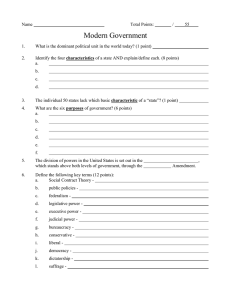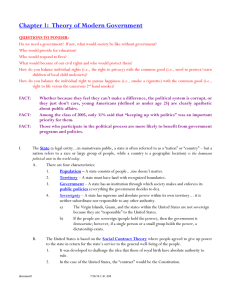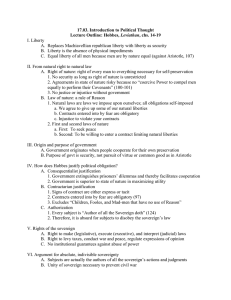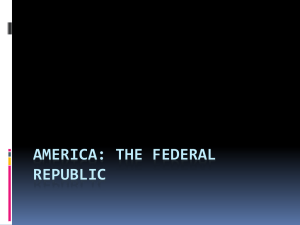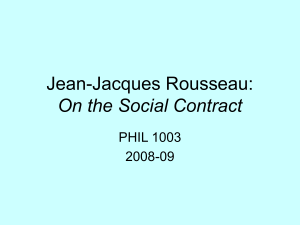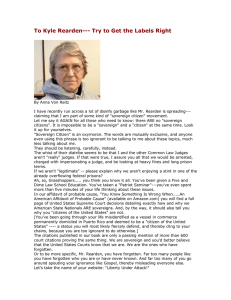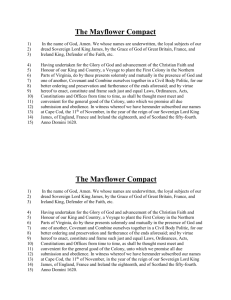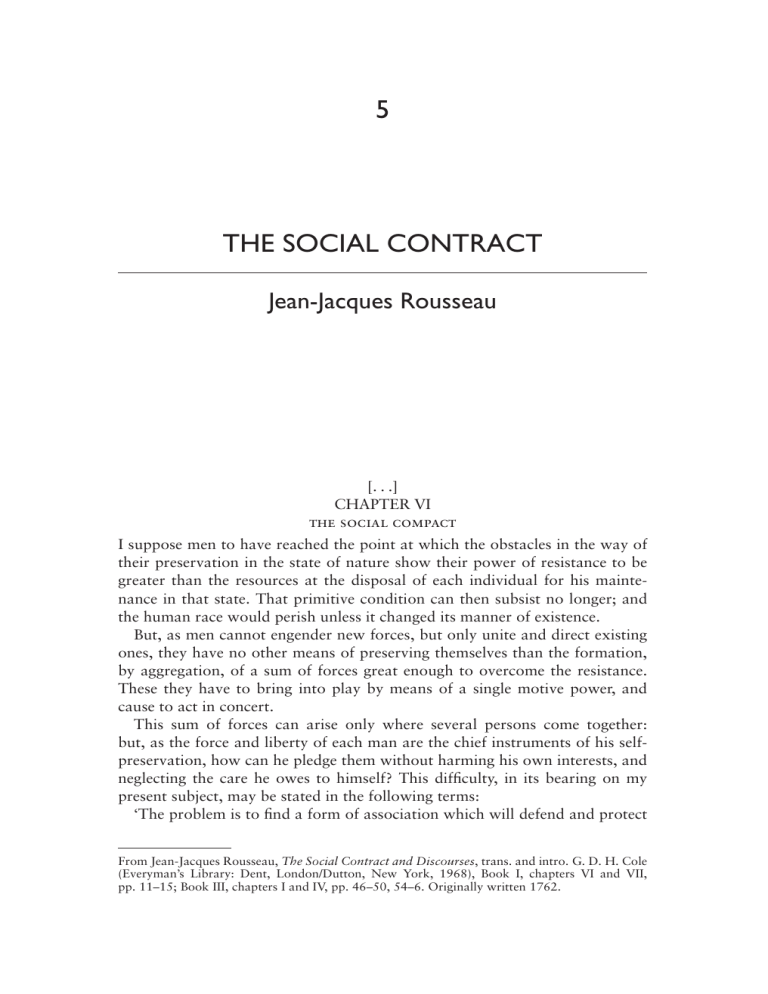
5 THE SOCIAL CONTRACT Jean-Jacques Rousseau 5 [. . .] CHAPTER VI the social compact I suppose men to have reached the point at which the obstacles in the way of their preservation in the state of nature show their power of resistance to be greater than the resources at the disposal of each individual for his maintenance in that state. That primitive condition can then subsist no longer; and the human race would perish unless it changed its manner of existence. But, as men cannot engender new forces, but only unite and direct existing ones, they have no other means of preserving themselves than the formation, by aggregation, of a sum of forces great enough to overcome the resistance. These they have to bring into play by means of a single motive power, and cause to act in concert. This sum of forces can arise only where several persons come together: but, as the force and liberty of each man are the chief instruments of his selfpreservation, how can he pledge them without harming his own interests, and neglecting the care he owes to himself? This difficulty, in its bearing on my present subject, may be stated in the following terms: ‘The problem is to find a form of association which will defend and protect From Jean-Jacques Rousseau, The Social Contract and Discourses, trans. and intro. G. D. H. Cole (Everyman’s Library: Dent, London/Dutton, New York, 1968), Book I, chapters VI and VII, pp. 11–15; Book III, chapters I and IV, pp. 46–50, 54–6. Originally written 1762. 44 JEAN-JACQUES ROUSSEAU with the whole common force the person and goods of each associate, and in which each, while uniting himself with all, may still obey himself alone, and remain as free as before.’ This is the fundamental problem of which the Social Contract provides the solution. The clauses of this contract are so determined by the nature of the act that the slightest modification would make them vain and ineffective; so that, although they have perhaps never been formally set forth, they are everywhere the same and everywhere tacitly admitted and recognized, until, on the violation of the social compact, each regains his original rights and resumes his natural liberty, while losing the conventional liberty in favour of which he renounced it. These clauses, properly understood, may be reduced to one – the total alienation of each associate, together with all his rights, to the whole community; for, in the first place, as each gives himself absolutely, the conditions are the same for all; and, this being so, no one has any interest in making them burdensome to others. Moreover, the alienation being without reserve, the union is as perfect as it can be, and no associate has anything more to demand: for, if the individuals retained certain rights, as there would be no common superior to decide between them and the public, each, being on one point his own judge, would ask to be so on all; the state of nature would thus continue, and the association would necessarily become inoperative or tyrannical. Finally, each man, in giving himself to all, gives himself to nobody; and as there is no associate over which he does not acquire the same right as he yields others over himself, he gains an equivalent for everything he loses, and an increase of force for the preservation of what he has. If then we discard from the social compact what is not of its essence, we shall find that it reduces itself to the following terms: ‘Each of us puts his person and all his power in common under the supreme direction of the general will, and, in our corporate capacity, we receive each member as an indivisible part of the whole.’ At once, in place of the individual personality of each contracting party, this act of association creates a moral and collective body, composed of as many members as the assembly contains voters, and receiving from this act its unity, its common identity, its life, and its will. This public person, so formed by the union of all other persons, formerly took the name of city,1 and now takes that of Republic or body politic; it is called by its members State when passive, Sovereign when active, and Power when compared with others like itself. Those who are associated in it take collectively the name of people, and severally are called citizens, as sharing in the sovereign power, and subjects, as being under the laws of the State. But these terms are often confused and taken one for another: it is enough to know how to distinguish them when they are being used with precision. THE SOCIAL CONTRACT 45 CHAPTER VII the sovereign This formula shows us that the act of association comprises a mutual undertaking between the public and the individuals, and that each individual, in making a contract, as we may say, with himself, is bound in a double capacity; as a member of the Sovereign he is bound to the individuals, and as a member of the State to the Sovereign. But the maxim of civil right, that no one is bound by undertakings made to himself, does not apply in this case; for there is a great difference between incurring an obligation to yourself and incurring one to a whole of which you form a part. Attention must further be called to the fact that public deliberation, while competent to bind all the subjects to the Sovereign, because of the two different capacities in which each of them may be regarded, cannot, for the opposite reason, bind the Sovereign to itself; and that it is consequently against the nature of the body politic for the Sovereign to impose on itself a law which it cannot infringe. Being able to regard itself in only one capacity, it is in the position of an individual who makes a contract with himself; and this makes it clear that there neither is nor can be any kind of fundamental law binding on the body of the people – not even the social contract itself. This does not mean that the body politic cannot enter into undertakings with others, provided the contract is not infringed by them; for in relation to what is external to it, it becomes a simple being, an individual. But the body politic or the Sovereign, drawing its being wholly from the sanctity of the contract, can never bind itself, even to an outsider, to do anything derogatory to the original act, for instance, to alienate any part of itself, or to submit to another Sovereign. Violation of the act by which it exists would be self-annihilation; and that which is itself nothing can create nothing. As soon as this multitude is so united in one body, it is impossible to offend against one of the members without attacking the body, and still more to offend against the body without the members resenting it. Duty and interest therefore equally oblige the two contracting parties to give each other help; and the same men should seek to combine, in their double capacity, all the advantages dependent upon that capacity. Again, the Sovereign, being formed wholly of the individuals who compose it, neither has nor can have any interest contrary to theirs; and consequently the sovereign power need give no guarantee to its subjects, because it is impossible for the body to wish to hurt all its members. We shall also see later on that it cannot hurt any in particular. The Sovereign, merely by virtue of what it is, is always what it should be. This, however, is not the case with the relation of the subjects to the Sovereign, which, despite the common interest, would have no security that they would fulfil their undertakings, unless it found means to assure itself of their fidelity. In fact, each individual, as a man, may have a particular will contrary or 46 JEAN-JACQUES ROUSSEAU dissimilar to the general will which he has as a citizen. His particular interest may speak to him quite differently from the common interest: his absolute and naturally independent existence may make him look upon what he owes to the common cause as a gratuitous contribution, the loss of which will do less harm to others than the payment of it is burdensome to himself; and, regarding the moral person which constitutes the State as a persona ficta, because not a man, he may wish to enjoy the rights of citizenship without being ready to fulfil the duties of a subject. The continuance of such an injustice could not but prove the undoing of the body politic. In order then that the social compact may not be an empty formula, it tacitly includes the undertaking, which alone can give force to the rest, that whoever refuses to obey the general will shall be compelled to do so by the whole body. This means nothing less than that he will be forced to be free; for this is the condition which, by giving each citizen to his country, secures him against all personal dependence. In this lies the key to the working of the political machine; this alone legitimizes civil undertakings, which, without it, would be absurd, tyrannical and liable to the most frightful abuses. [. . .] BOOK III Before speaking of the different forms of government, let us try to fix the exact sense of the word, which has not yet been very clearly explained. CHAPTER I government in general I warn the reader that this chapter requires careful reading, and that I am unable to make myself clear to those who refuse to be attentive. Every free action is produced by the concurrence of two causes; one moral, i.e. the will which determines the act; the other physical, i.e. the power which executes it. When I walk towards an object, it is necessary first that I should will to go there, and, in the second place, that my feet should carry me. If a paralytic wills to run and an active man wills not to, they will both stay where they are. The body politic has the same motive powers; here too force and will are distinguished, will under the name of legislative power and force under that of executive power. Without their concurrence, nothing is, or should be, done. We have seen that the legislative power belongs to the people, and can belong to it alone. It may, on the other hand, readily be seen, from the principles laid down above, that the executive power cannot belong to the generality as legislature or Sovereign, because it consists wholly of particular acts which fall outside the competency of the law, and consequently of the Sovereign, whose acts must always be laws. The public force therefore needs an agent of its own to bind it together and set it to work under the direction of the general will, to serve as a means of communication between the State and the Sovereign, and to do for the collective person more or less what the union of soul and body does for man. Here THE SOCIAL CONTRACT 47 we have what is, in the State, the basis of government, often wrongly confused with the Sovereign, whose minister it is. What then is government? An intermediate body set up between the subjects and the Sovereign, to secure their mutual correspondence, charged with the execution of the laws and the maintenance of liberty, both civil and political. The members of this body are called magistrates or kings, that is to say governors, and the whole body bears the name prince.2 Thus those who hold that the act, by which a people puts itself under a prince, is not a contract, are certainly right. It is simply and solely a commission, an employment, in which the rulers, mere officials of the Sovereign, exercise in their own name the power of which it makes them depositaries. This power it can limit, modify, or recover at pleasure; for the alienation of such a right is incompatible with the nature of the social body, and contrary to the end of association. I call then government, or supreme administration, the legitimate exercise of the executive power, and prince or magistrate the man or the body entrusted with that administration. In government reside the intermediate forces whose relations make up that of the whole to the whole, or of the Sovereign to the State. This last relation may be represented as that between the extreme terms of a continuous proportion, which has government as its mean proportional. The government gets from the Sovereign the orders it gives the people, and, for the State to be properly balanced, there must, when everything is reckoned in, be equality between the product or power of the government taken in itself, and the product or power of the citizens, who are on the one hand sovereign and on the other subject. Furthermore, none of these three terms can be altered without the equality being instantly destroyed. If the Sovereign desires to govern, or the magistrate to give laws, or if the subjects refuse to obey, disorder takes the place of regularity, force and will no longer act together, and the State is dissolved and falls into despotism or anarchy. Lastly, as there is only one mean proportional between each relation, there is also only one good government possible for a State. But, as countless events may change the relations of a people, not only may different governments be good for different peoples, but also for the same people at different times. In attempting to give some idea of the various relations that may hold between these two extreme terms, I shall take as an example the number of a people, which is the most easily expressible. Suppose the State is composed of ten thousand citizens. The Sovereign can only be considered collectively and as a body; but each member, as being a subject, is regarded as an individual: thus the Sovereign is to the subject as ten thousand to one, i.e. each member of the State has as his share only a ten-thousandth part of the sovereign authority, although he is wholly under its control. If the people numbers a hundred thousand, the condition of the subject undergoes no change, and each equally is under the whole authority of the laws, while his vote, being reduced to one hundred thousandth part, has 48 JEAN-JACQUES ROUSSEAU ten times less influence in drawing them up. The subject therefore remaining always a unit, the relation between him and the Sovereign increases with the number of the citizens. From this it follows that, the larger the State, the less the liberty. When I say the relation increases, I mean that it grows more unequal. Thus the greater it is in the geometrical sense, the less relation there is in the ordinary sense of the word. In the former sense, the relation, considered according to quantity, is expressed by the quotient; in the latter, considered according to identity, it is reckoned by similarity. Now, the less relation the particular wills have to the general will, that is, morals and manners to laws, the more should the repressive force be increased. The government, then, to be good, should be proportionately stronger as the people is more numerous. On the other hand, as the growth of the State gives the depositaries of the public authority more temptations and chances of abusing their power, the greater the force with which the government ought to be endowed for keeping the people in hand, the greater too should be the force at the disposal of the Sovereign for keeping the government in hand. I am speaking, not of absolute force, but of the relative force of the different parts of the State. It follows from this double relation that the continuous proportion between the Sovereign, the prince, and the people, is by no means an arbitrary idea, but a necessary consequence of the nature of the body politic. It follows further that, one of the extreme terms, viz. the people, as subject, being fixed and represented by unity, whenever the duplicate ratio increases or diminishes, the simple ratio does the same, and is changed accordingly. From this we see that there is not a single unique and absolute form of government, but as many governments differing in nature as there are States differing in size. If, ridiculing this system, any one were to say that, in order to find the mean proportional and give form to the body of the government, it is only necessary, according to me, to find the square root of the number of the people, I should answer that I am here taking this number only as an instance; that the relations of which I am speaking are not measured by the number of men alone, but generally by the amount of action, which is a combination of a multitude of causes; and that, further, if, to save words, I borrow for a moment the terms of geometry, I am none the less well aware that moral quantities do not allow of geometrical accuracy. The government is on a small scale what the body politic which includes it is on a great one. It is a moral person endowed with certain faculties, active like the Sovereign and passive like the State, and capable of being resolved into other similar relations. This accordingly gives rise to a new proportion, within which there is yet another, according to the arrangement of the magistracies, till an indivisible middle term is reached, i.e. a single ruler or supreme magistrate, who may be represented, in the midst of this progression, as the unity between the fractional and the ordinal series. THE SOCIAL CONTRACT 49 Without encumbering ourselves with this multiplication of terms, let us rest content with regarding government as a new body within the State, distinct from the people and the Sovereign, and intermediate between them. There is between these two bodies this essential difference, that the State exists by itself, and the government only through the Sovereign. Thus the dominant will of the prince is, or should be, nothing but the general will or the law; his force is only the public force concentrated in his hands, and, as soon as he tries to base any absolute and independent act on his own authority, the tie that binds the whole together begins to be loosened. If finally the prince should come to have a particular will more active than the will of the Sovereign, and should employ the public force in his hands in obedience to this particular will, there would be, so to speak, two Sovereigns, one rightful and the other actual, the social union would evaporate instantly, and the body politic would be dissolved. However, in order that the government may have a true existence and a real life distinguishing it from the body of the State, and in order that all its members may be able to act in concert and fulfil the end for which it was set up, it must have a particular personality, a sensibility common to its members, and a force and will of its own making for its preservation. This particular existence implies assemblies, councils, power of deliberation and decision, rights, titles, and privileges belonging exclusively to the prince and making the office of magistrate more honourable in proportion as it is more troublesome. The difficulties lie in the manner of so ordering this subordinate whole within the whole, that it in no way alters the general constitution by affirmation of its own, and always distinguishes the particular force it possesses, which is destined to aid in its preservation, from the public force, which is destined to the preservation of the State; and, in a word, is always ready to sacrifice the government to the people, and never to sacrifice the people to the government. Furthermore, although the artificial body of the government is the work of another artificial body, and has, we may say, only a borrowed and subordinate life, this does not prevent it from being able to act with more or less vigour or promptitude, or from being, so to speak, in more or less robust health. Finally, without departing directly from the end for which it was instituted, it may deviate more or less from it, according to the manner of its constitution. From all these differences arise the various relations which the government ought to bear to the body of the State, according to the accidental and particular relations by which the State itself is modified, for often the government that is best in itself will become the most pernicious, if the relations in which it stands have altered according to the defects of the body politic to which it belongs. [. . .] 50 JEAN-JACQUES ROUSSEAU CHAPTER IV democracy He who makes the law knows better than any one else how it should be executed and interpreted. It seems then impossible to have a better constitution than that in which the executive and legislative powers are united; but this very fact renders the government in certain respects inadequate, because things which should be distinguished are confounded, and the prince and the Sovereign, being the same person, form, so to speak, no more than a government without government. It is not good for him who makes the laws to execute them, or for the body of the people to turn its attention away from a general standpoint and devote it to particular objects. Nothing is more dangerous than the influence of private interests in public affairs, and the abuse of the laws by the government is a less evil than the corruption of the legislator, which is the inevitable sequel to a particular standpoint. In such a case, the State being altered in substance, all reformation becomes impossible. A people that would never misuse governmental powers would never misuse independence; a people that would always govern well would not need to be governed. If we take the term in the strict sense, there never has been a real democracy, and there never will be. It is against the natural order for the many to govern and the few to be governed. It is unimaginable that the people should remain continually assembled to devote their time to public affairs, and it is clear that they cannot set up commissions for that purpose without the form of administration being changed. In fact, I can confidently lay down as a principle that, when the functions of government are shared by several tribunals, the less numerous sooner or later acquire the greatest authority, if only because they are in position to expedite affairs, and power thus naturally comes into their hands. Besides, how many conditions that are difficult to unite does such a government presuppose! First, a very small State, where the people can readily be got together and where each citizen can with ease know all the rest; secondly, great simplicity of manners, to prevent business from multiplying and raising thorny problems; next, a large measure of equality in rank and fortune, without which equality of rights and authority cannot long subsist; lastly, little or no luxury – for luxury either comes of riches or makes them necessary; it corrupts at once rich and poor, the rich by possession and the poor by covetousness; it sells the country to softness and vanity, and takes away from the State all its citizens, to make them slaves one to another, and one and all to public opinion. This is why a famous writer has made virtue the fundamental principle of Republics; for all these conditions could not exist without virtue. But, for want of the necessary distinctions, that great thinker was often inexact, and sometimes obscure, and did not see that, the sovereign authority being everywhere the same, the same principle should be found in every well-constituted State, in a greater or less degree, it is true, according to the form of the government. THE SOCIAL CONTRACT 51 It may be added that there is no government so subject to civil wars and intestine agitations as democratic or popular government, because there is none which has so strong and continual a tendency to change to another form, or which demands more vigilance and courage for its maintenance as it is. Under such a constitution above all, the citizen should arm himself with strength and constancy, and say, every day of his life, what a virtuous Count Palatine3 said in the Diet of Poland: ‘Malo periculosam libertatam quam quietum servitium.’ Were there a people of gods, their government would be democratic. So perfect a government is not for men. [. . .] Notes 1. The real meaning of this word has been almost wholly lost in modern times; most people mistake a town for a city, and a townsman for a citizen. They do not know that houses make a town, but citizens a city. The same mistake long ago cost the Carthaginians dear. I have never read of the title of citizens being given to the subjects of any prince, not even the ancient Macedonians or the English of to-day, though they are nearer liberty than any one else. The French alone everywhere familiarly adopt the name of citizens, because, as can be seen from their dictionaries, they have no idea of its meaning; otherwise they would be guilty in usurping it, of the crime of lèse-majesté: among them, the name expresses a virtue, and not a right. When Bodin spoke of our citizens and townsmen, he fell into a bad blunder in taking the one class for the other. M. d’Alembert has avoided the error, and, in his article on Geneva, has clearly distinguished the four orders of men (or even five, counting mere foreigners) who dwell in our town, of which two only compose the Republic. No other French writer, to my knowledge, has understood the real meaning of the word citizen. 2. Thus at Venice the College, even in the absence of the Doge, is called ‘Most Serene Prince.’ 3. The Palatine of Posen, father of the King of Poland, Duke of Lorraine. [I prefer liberty with danger to peace with slavery.]
